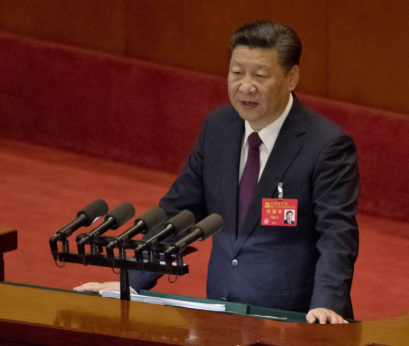
If official media reports are to be believed, Xi Jinping, General Secretary of the Communist Party of China (CPC) and President of the People’s Republic, recently told the Politburo that a profound understanding of Marxism on the part of the country’s leadership was essential. He warned his colleagues that any abandonment of Marxism would cause the CPC “to lose its soul and direction.”
As the CPC approached its 19th national congress, which opened in Beijing on Wednesday, he also suggested that the Chinese people, largely because of the profound social and economic changes their society has undergone in recent decades, are in a unique position to further develop those theories first elaborated by the authors of The Communist Manifesto.
I confess to being puzzled by academics, pundits, and ordinary followers of the global scene who casually affirm, as though it were a given, that Beijing has abandoned Marxism and socialism. Perhaps this is an unreasonable reaction to such affirmations, since the reasoning behind them isn’t obscure. China’s is a market economy; there is no doubt about it. The private sector is large and flourishing, generating the bulk of new employment. The country now boasts a vigorous capitalist class, often fabulously rich (and notoriously vulgar in its consumption habits). Inequality, both between regions and social strata, can be striking.
Yet, it is undoubtedly worthwhile to listen to what the Communist Party itself says, to consider its own elaborations on the “Chinese road to socialism,” and to study what is actually occurring here. Party thinkers put matters quite simply and in terms that strike me as notably Marxist: the rapid and comprehensive development of the productive forces remains the primary task and the condition for present and future prosperity. The relative equality of pauperism, part of Mao’s legacy, is not a communist vision; rather, decent remuneration according to work and, increasingly, services supplied on the basis of need, require a highly developed material base. And accelerated development is most effectively accomplished through a thorough integration in the world economy, which means wholehearted participation in markets—even as the state drives the process.
The results have been far from trauma-free, of course. But these results include, over the past three decades, the greatest poverty alleviation program in the history of the world, an initiative that has seen perhaps half a billion people rise from destitution. Last year alone, more than 12 million rural citizens of China stepped over the poverty line, according to government statistics.
Even as the party encourages private enterprise and initiatives from civil society (in the shadow of such slogans as “Small State, Big Society”) the Chinese public sector remains far from modest. At its apex, and under the direction of the State-owned Assets Supervision and Administration Commission (SASAC), there are just over 100 publicly-owned, central-level, non-financial enterprises. Then there are numerous players in banking and finance ultimately held by the China Investment Corporation. Add to this the myriad subsidiaries of these just-mentioned entities, along with many thousands of more firms controlled by regional and municipal SASACs and governments, and one begins to get a general idea of the public sector’s reach. And then consider the fact that of 1,624 listed private companies in the country, some 23 percent name state entities as top, though not controlling, shareholders. (Indeed, this mixed ownership model cuts both ways, as a majority of publicly traded entities effectively controlled by the state also list at least one individual among their top ten shareholders.)
So-called productive sectors where the Chinese state remains dominant or prominent include finance, telecommunications, energy, aviation, engineering and construction, and even vehicles and auto parts. And then of course there is the terrain of social service provision—healthcare, education, and related fields—in which public entities are leading if not monopolistic providers.

Clearly, what can be expected in coming years is more of the same: continued state and party control of key sectors alongside an ongoing effort to attract international capital; subsidies for public and domestic private players alike that appear capable of innovating and creating employment; and a well-publicized fight against corruption designed to shore up party legitimacy and improve economic efficiency. The model is mixed ownership, with the state holding a decisive place in decisive spheres.
Meanwhile, looking beyond its borders, Beijing is placing enormous emphasis on its Belt and Road project, an international infrastructure initiative designed to link the country with markets along the historic “Silk Road.” The plan also involves boosting capacity within the borders of neighboring and more distant states in which China invests and with whom it trades.
Of course, any discussion of state and party control over socioeconomic life in China leads to additional questions. Most notable is this one: if markets prevail, and if reforms in China have indubitably allowed a capitalist class to re-emerge (not to mention a state-linked elite with considerable income and privilege), what about the workers? Specifically, if socialism and communism are to remain on the agenda, must the working class not have its own self-defense organizations, whose effectiveness depends precisely on their democracy and autonomy?
This is a theme partially recognized in theory, by the way, by the All-China Federation of Trade Unions—and even to some extent in practice. But it is a work in progress, to say the least. Suffice at this point to note two things: Chinese workers are often not shy about taking action if they are ripped off; and when ripped off, they are often disinclined to rely on their official representatives.
Bennett Guillaume, currently based in Shanghai, is a writer for People’s Voice newspaper, where this article originally appeared.










